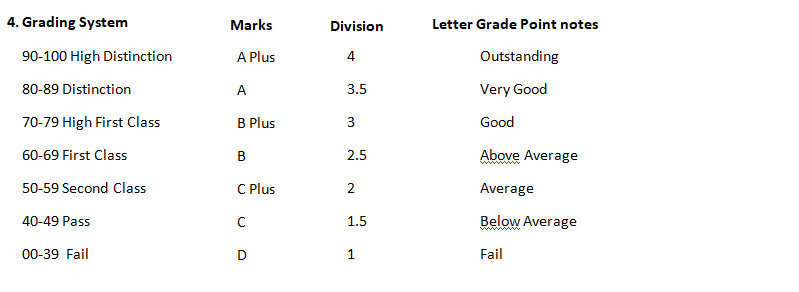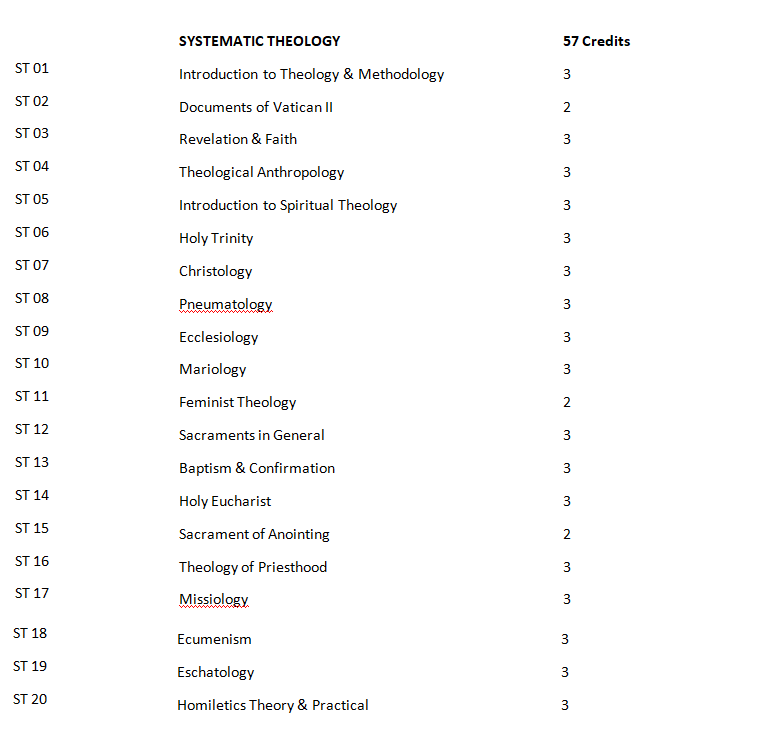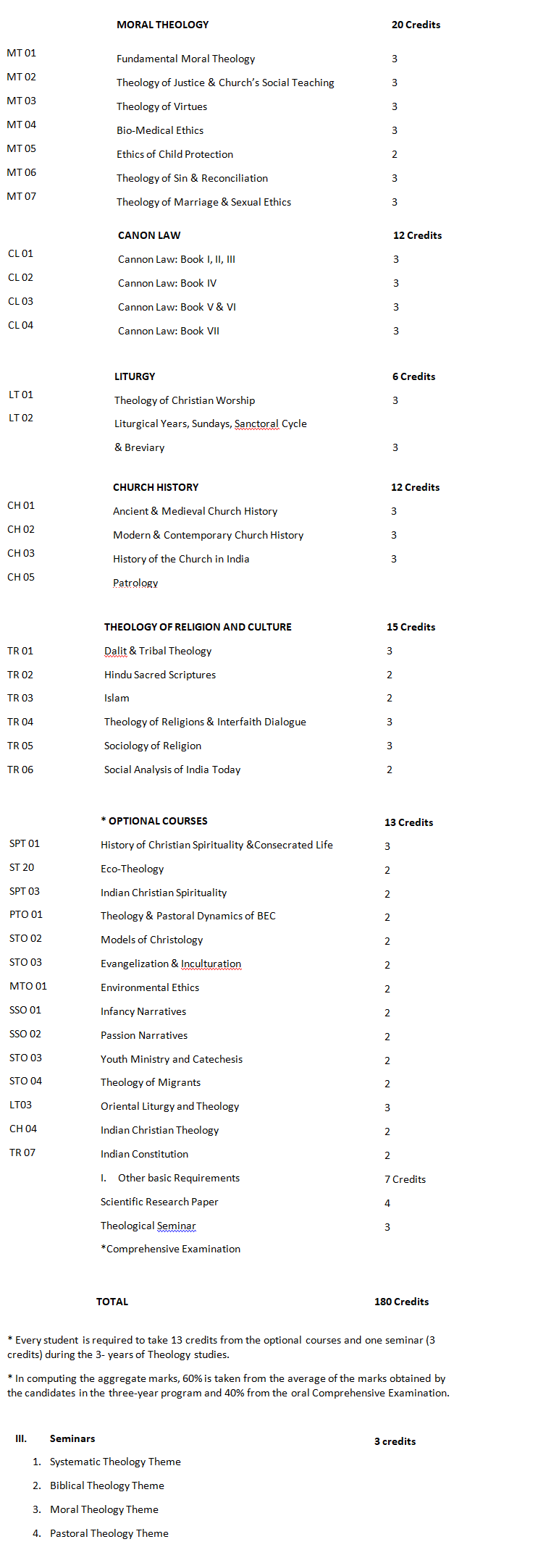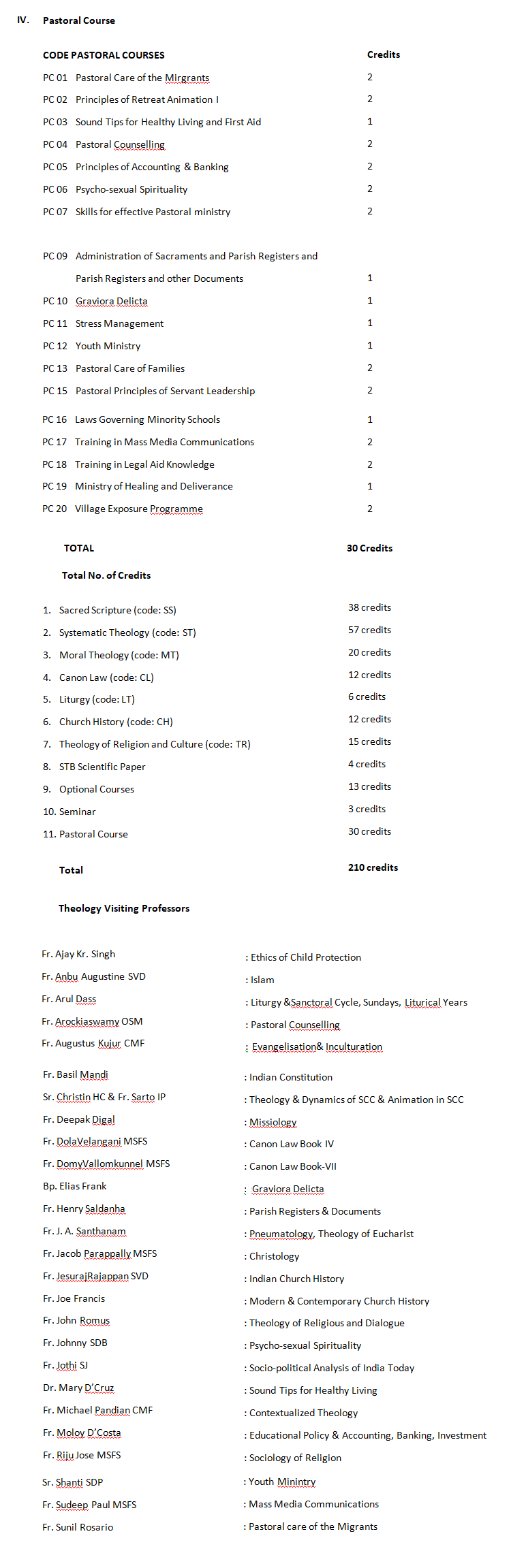THEOLOGY
Form Th. A. MSC. Admission. Form. Theology. (2025-26).
Form Th. B. MSC. Application Form. Theology. (2025-26).
Form Th. C. MSC. Admission Form. Theology (2025-26)- Day scholars
Form Th. D. MSC. Admission Form. Theology (2025-26) - One year Course
Form Th. B. MSC. Application Form. Theology. (2025-26).
Form Th. C. MSC. Admission Form. Theology (2025-26)- Day scholars
Form Th. D. MSC. Admission Form. Theology (2025-26) - One year Course
MORNING STAR INSTITUTE OF THEOLOGY is affiliated to the Faculty of Theology of Jnana Deepa, Institute of Philosophy and Theology, Pune. The Institute offers an academic curriculum that is comprehensive and contemporary, relevant and meaningful to the needs of the Church, society and academy. The programme of studies includes a wide range of courses in Sacred Scripture, Systematic, Moral, Sacramental, Historical, Pastoral and Spiritual Theology, Canon Law, Liturgy, Homiletics, World religious, Theology of Religious Pluralism, Ecumensim, Sociology of Religion and Ecology. There are also number of Optional courses, Seminars and Exposure Programmes. All the disciplines are designed to make theological education a scientific learning for creative and critical reflection and pastoral action.
1. SacraeTheologiae Baccalaureate (STB) Course
1.1. Admission Requirments
1.1.1. Clerical Students
(a) A Bachelor’s Degree or its equivalent from a recognized institution.
(b) Successful completion of a seminary course of at least two years in Philosophy from a recognized ecclesiastical institution.
(c) Proficiency in English
1.1.2. Non-Clerical Students
(a) A Bachelor’s Degree or its Equivalent from a recognized institution.
(b) Successful completion of a seminary course of two years in Philosophy from a recognized institution.
(c) Proficiency in English
1.1.3 Two-Year Diploma Course:
(a) Pre-University (10+2) certificate or its equivalent
(b) Adequate knowledge of English
1.1.4 One-Year Certificate Course in Theology [Certificate Course in Theology for laity]
(CCT):
(a) Matriculation or its equivalent
(b) Adequate knowledge of English
General note:
It goes without saying that the STB, Diploma and Certificate courses are open to clerical and non-clerical students, who meet the requirements. Admission form/s (which can be obtained from the office any time of the year except holidays), duly filled in, along with required documents, must reach the Registrar’s Office by January 15.
Course Content
A. STB Programme
(a) The STB Programme for clerical students, which includes the Pastoral programme, covers four years during which a student is expected to obtain 210 credits. Of these 210 credits, 164 are to be taken from the Basic Courses offered for each year of the three-year course and 16 credits are to be taken from the Optional Courses and Seminars. The course content and details are given below. All courses and exposure programmes are credited. A credit is a unit of 25 study hours inclusive of class periods and personal and library work proposed by the teacher.
(b) Students who are not candidates for priesthood are required to complete only 180 credits: 164 credits for basic Courses and 16 credits for Optional Courses and Seminars. This is to be done in consultation with the Director of Theology.
(c) All courses are completed for Ad-Audiendas in the third week of January on the dates marked in the Handbook & Calendar. All the students registered for STB Degree, submit their Scientific Research Paper theses by the end of March, the details of which are given below. In the fourth year, July and August are assigned to prepare for the STB Comprehensive Examination, which is held in the last week of August on dates marked in the Calendar. This is followed by the Pastoral Course (a two-month module).
(d) The Basic Courses are obligatory, and any exemption from them needs the written permission of the Director of Studies, a copy of which is to be submitted to the Registrar.
B. Two-Year Diploma Course
Those who do not have a Bachelor’s degree may be given admission to the programme of theological studies. The Diploma Course students follow the complete course of Theology without seeking academic degrees.
C. Certificate Course in Theology for Laity (CCT)
(a) The Certificate Course in Theology (CCT) is a unique study programme having its own specific thrust and emphasis, offered primarily for the laity. However, it is open to anyone who wishes to attend, irrespective of one’s state of life or religious affiliation. This course, consisting of 36 credits, is given every Saturday evening in the Archbishop’s House campus, Kolkata.
(b) The course is to equip the laity with adequate theological knowledge to form them as lay leaders, to guide and animate the faithful for the celebration of the liturgy, bible sharing group, SCC meetings, and to teach catechism in schools.
D. Evaluation of Courses
All credits-courses are evaluated with marks. Based on Biannual Twice system, examinations are held twice in a year at the end of each term on the dates indicated in the Handbook & Calendar. All courses having the value of 3 or more credits require the students to submit written assignments carrying 40 marks, besides 2 hours written or 10 minutes oral examination of 60 marks. In consultation with the Director of studies, the teachers are free to follow multiple evaluation system. The examiners are obliged to submit the results of the terminal examinations to the Director not later than 30 days of the examinations.
1. Scientific Research Paper
The third year students of STB write a research paper (STB Essay) of 30-35 pages on a theological subject under the guidance of a teacher. It should be written on A 4 size paper with 1.5 spaces. 4 credits are assigned to it. The research Guide shall be one of the resident teachers. The director of Studies is to be informed in writing, of the scientific research paper and of the Guide who directs it.
2. Ad Audiendas Examination
The third year B.Th. students will appear for a Pastoral and Moral Comprehensive Examination (Ad Audiendas) on the dates marked in the calendar. It is conducted by a board of 3 examiners for 30 minutes (each examiner gets 10 minutes) in which a student is examined on his knowledge of morals, canon law, correct pastoral approaches to contemporary problems of Christian living and proper skills in the administration of the sacraments.
3. Comprehensive Examination
The comprehensive examination is conducted by a board of 3 teachers, each getting 20 minutes to examine the student. In computing the aggregate marks, 60% is taken from the average of the marks obtained by the candidate in the three-year programme and 40% from the oral comprehensive examination. Only those who score 55% of the aggregate marks of all the examinations will be eligible to sit for the STB comprehensive examinations will be eligible to sit for the STB comprehensive examination. Those who do not score the required 55% will sit for the comprehensive examination along with others, but they will be awarded Diploma certificates.

5. Repetitions
A student who fails in examination is obliged to repeat and pass in the examination. The re-examination is to be done in the subsequent terminal examination dates, in consultation with the Dean. A student is allowed to repeat an examination only once. If a student fails to do the repetition within the stipulated time, he / she forfeits his / her right to do the same. Repetitions of the previous year are to be completed during the dates allotted to the first terminal examination of the following year. Two repetitions are allowed for Pastoral and Moral Comprehensive Examination.
F. Promotion Policy
A student who fails in 5 or more subjects in a year must repeat that year.
G. Disciplinary Actions
Stringent disciplinary action will be taken against students who have recourse to cheating in examination or malpractices in written assignments. For the following offences a student can be expelled from MSIT: copying during examination from another student or from written material brought into the examination hall; using books with hand-written notes in margins; plagiarism in dissertations/ assignments/ papers; recycling of old papers/assignments; cutting and pasting materials; tampering with the matter or marks on answer scripts/assignments returned to the student. The decision of the teaching staff, which will be communicated by the Rector, is final in these disciplinary matters.
H. Students’ Council
The Students’ Council is an advisory body (not a decision-making one), which has its aim and function to facilitate responsible involvement and meaningful participation of students in academic matters and foster constructive dialogue between staff and students. The president and the secretary of the council (and a representative from each class, if so desired) will represent the students’ body in the Theology department (staff) meeting, as and when required (cf. Statutes, II & IV).
STB Syllabus and Accreditation of Courses




1. SacraeTheologiae Baccalaureate (STB) Course
1.1. Admission Requirments
1.1.1. Clerical Students
(a) A Bachelor’s Degree or its equivalent from a recognized institution.
(b) Successful completion of a seminary course of at least two years in Philosophy from a recognized ecclesiastical institution.
(c) Proficiency in English
1.1.2. Non-Clerical Students
(a) A Bachelor’s Degree or its Equivalent from a recognized institution.
(b) Successful completion of a seminary course of two years in Philosophy from a recognized institution.
(c) Proficiency in English
1.1.3 Two-Year Diploma Course:
(a) Pre-University (10+2) certificate or its equivalent
(b) Adequate knowledge of English
1.1.4 One-Year Certificate Course in Theology [Certificate Course in Theology for laity]
(CCT):
(a) Matriculation or its equivalent
(b) Adequate knowledge of English
General note:
It goes without saying that the STB, Diploma and Certificate courses are open to clerical and non-clerical students, who meet the requirements. Admission form/s (which can be obtained from the office any time of the year except holidays), duly filled in, along with required documents, must reach the Registrar’s Office by January 15.
Course Content
A. STB Programme
(a) The STB Programme for clerical students, which includes the Pastoral programme, covers four years during which a student is expected to obtain 210 credits. Of these 210 credits, 164 are to be taken from the Basic Courses offered for each year of the three-year course and 16 credits are to be taken from the Optional Courses and Seminars. The course content and details are given below. All courses and exposure programmes are credited. A credit is a unit of 25 study hours inclusive of class periods and personal and library work proposed by the teacher.
(b) Students who are not candidates for priesthood are required to complete only 180 credits: 164 credits for basic Courses and 16 credits for Optional Courses and Seminars. This is to be done in consultation with the Director of Theology.
(c) All courses are completed for Ad-Audiendas in the third week of January on the dates marked in the Handbook & Calendar. All the students registered for STB Degree, submit their Scientific Research Paper theses by the end of March, the details of which are given below. In the fourth year, July and August are assigned to prepare for the STB Comprehensive Examination, which is held in the last week of August on dates marked in the Calendar. This is followed by the Pastoral Course (a two-month module).
(d) The Basic Courses are obligatory, and any exemption from them needs the written permission of the Director of Studies, a copy of which is to be submitted to the Registrar.
B. Two-Year Diploma Course
Those who do not have a Bachelor’s degree may be given admission to the programme of theological studies. The Diploma Course students follow the complete course of Theology without seeking academic degrees.
C. Certificate Course in Theology for Laity (CCT)
(a) The Certificate Course in Theology (CCT) is a unique study programme having its own specific thrust and emphasis, offered primarily for the laity. However, it is open to anyone who wishes to attend, irrespective of one’s state of life or religious affiliation. This course, consisting of 36 credits, is given every Saturday evening in the Archbishop’s House campus, Kolkata.
(b) The course is to equip the laity with adequate theological knowledge to form them as lay leaders, to guide and animate the faithful for the celebration of the liturgy, bible sharing group, SCC meetings, and to teach catechism in schools.
D. Evaluation of Courses
All credits-courses are evaluated with marks. Based on Biannual Twice system, examinations are held twice in a year at the end of each term on the dates indicated in the Handbook & Calendar. All courses having the value of 3 or more credits require the students to submit written assignments carrying 40 marks, besides 2 hours written or 10 minutes oral examination of 60 marks. In consultation with the Director of studies, the teachers are free to follow multiple evaluation system. The examiners are obliged to submit the results of the terminal examinations to the Director not later than 30 days of the examinations.
1. Scientific Research Paper
The third year students of STB write a research paper (STB Essay) of 30-35 pages on a theological subject under the guidance of a teacher. It should be written on A 4 size paper with 1.5 spaces. 4 credits are assigned to it. The research Guide shall be one of the resident teachers. The director of Studies is to be informed in writing, of the scientific research paper and of the Guide who directs it.
2. Ad Audiendas Examination
The third year B.Th. students will appear for a Pastoral and Moral Comprehensive Examination (Ad Audiendas) on the dates marked in the calendar. It is conducted by a board of 3 examiners for 30 minutes (each examiner gets 10 minutes) in which a student is examined on his knowledge of morals, canon law, correct pastoral approaches to contemporary problems of Christian living and proper skills in the administration of the sacraments.
3. Comprehensive Examination
The comprehensive examination is conducted by a board of 3 teachers, each getting 20 minutes to examine the student. In computing the aggregate marks, 60% is taken from the average of the marks obtained by the candidate in the three-year programme and 40% from the oral comprehensive examination. Only those who score 55% of the aggregate marks of all the examinations will be eligible to sit for the STB comprehensive examinations will be eligible to sit for the STB comprehensive examination. Those who do not score the required 55% will sit for the comprehensive examination along with others, but they will be awarded Diploma certificates.

5. Repetitions
A student who fails in examination is obliged to repeat and pass in the examination. The re-examination is to be done in the subsequent terminal examination dates, in consultation with the Dean. A student is allowed to repeat an examination only once. If a student fails to do the repetition within the stipulated time, he / she forfeits his / her right to do the same. Repetitions of the previous year are to be completed during the dates allotted to the first terminal examination of the following year. Two repetitions are allowed for Pastoral and Moral Comprehensive Examination.
F. Promotion Policy
A student who fails in 5 or more subjects in a year must repeat that year.
G. Disciplinary Actions
Stringent disciplinary action will be taken against students who have recourse to cheating in examination or malpractices in written assignments. For the following offences a student can be expelled from MSIT: copying during examination from another student or from written material brought into the examination hall; using books with hand-written notes in margins; plagiarism in dissertations/ assignments/ papers; recycling of old papers/assignments; cutting and pasting materials; tampering with the matter or marks on answer scripts/assignments returned to the student. The decision of the teaching staff, which will be communicated by the Rector, is final in these disciplinary matters.
H. Students’ Council
The Students’ Council is an advisory body (not a decision-making one), which has its aim and function to facilitate responsible involvement and meaningful participation of students in academic matters and foster constructive dialogue between staff and students. The president and the secretary of the council (and a representative from each class, if so desired) will represent the students’ body in the Theology department (staff) meeting, as and when required (cf. Statutes, II & IV).
STB Syllabus and Accreditation of Courses





